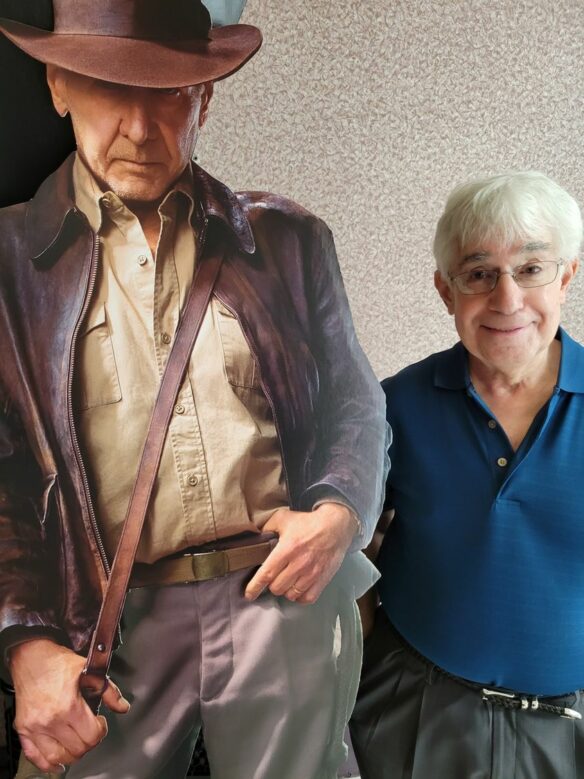
Review by Steve Vertlieb: Indiana Jones and the Dial of Destiny began production in 2021 and had been scheduled by Disney and Paramount to have been released during June 2022. As the hills were alive with the sound of money last Summer, the studio decided to wait an additional year before releasing the film, fearing that it might become lost amidst of a slate of blockbusters waiting to take off that season. Additionally, its star, Harrison Ford, had been injured during the filming, delaying the picture’s completion still further. A year of anticipation and waiting both baffled and irritated organized fandom, while a social media backlash had already begun building months before the picture’s re-scheduled release date. Rumors abounded with stories of scripting problems, and ill-conceived structures and concepts. Frustration had only grown over the ensuing months, and speculation festered in the minds and hearts of jaded movie goers that this final film in the “Indiana Jones” franchise would be a catastrophe, either worse than, or on a par with the disastrously received Indiana Jones and the Kingdom of the Crystal Skull in 2008. The sad reality of the beloved series was that there hadn’t been a universally well received entry in the saga since Indiana Jones and the Last Crusade in Spring, 1989. Not only had the public grown weary of Indy’s most recent exploits, but the film’s director, Steven Spielberg, had seemingly run out of ideas and inspiration. Both the director and his star appeared aged and tired in the fourth and seemingly final entry in the series. Indeed, when the fifth and definitively final film in the forty-year-old franchise was initially announced, with Harrison Ford once again starring, but with a new director, James Mangold at the helm, the trepidation among the film’s targeted audience was palpable.
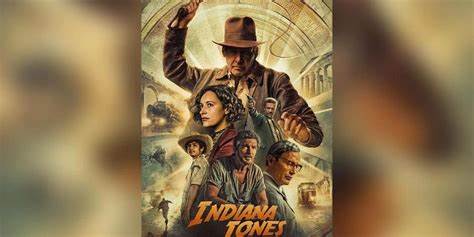
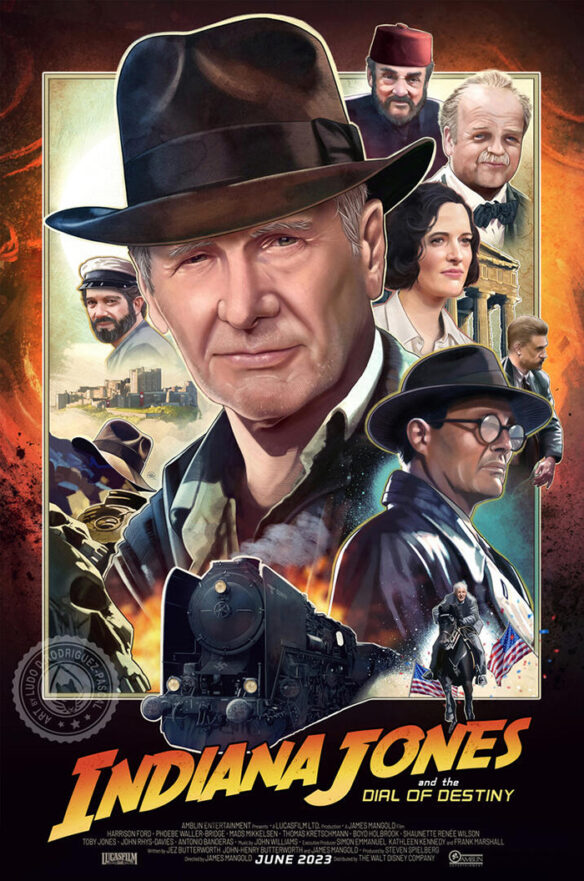
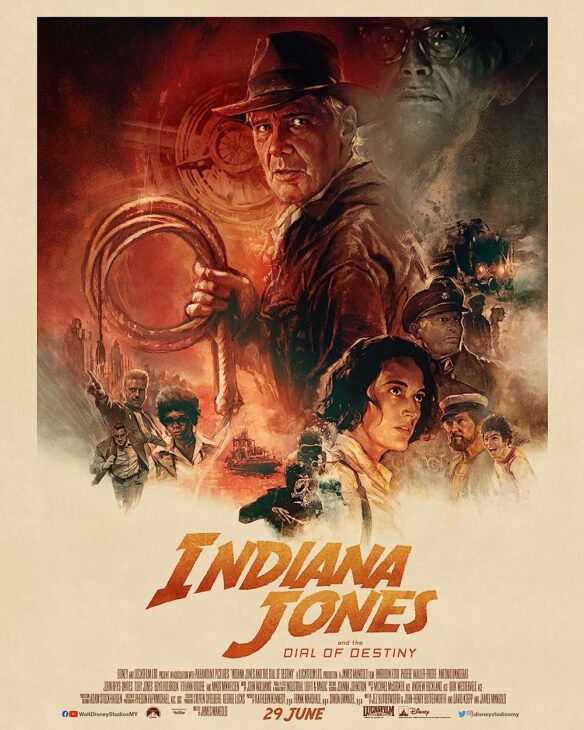
When the film premiered in Spring 2023, reviews were decidedly mixed, with critical reaction either lukewarm, or openly hostile. Decades of expectation had seemingly ruined the picture for audiences yet to come, while preview critiques had deemed the film a failure, sadly derivative, tired, and bereft of inspiration. The long, hopelessly frustrating wait seemed to indicate that the film, despite its whispered lofty ambitions, would be dead on arrival at the box office when it opened finally on June 30th. Happily, and perhaps beyond reasonable expectations, this last entry in the “Indiana Jones” series is anything but a failure.
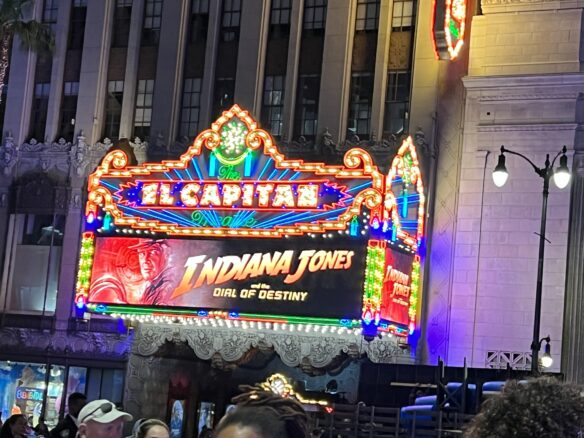
Indiana Jones and the Dial of Destiny is a joyous throwback to another time, a happily full-blooded adventure thriller that harkens memories of the most memorable moments from the original series, as well as the Thirties Universal, Mascot, and Republic serials that first inspired them. James Mangold, whose impressive credits include directing Logan, thereby reinventing the “Wolverine” franchise, as well as the delightfully charming time travel romance, Kate and Leopold, has breathed new life into the George Lucas/Steven Spielberg “cliff hangers” with a fresh new take on the reality of time, age, and psychological expiration. Henry Jones no longer looks forward to another adventure, but has succumbed to the relative boredom of complacency, and almost numbing retirement. His lectures to his final group of students have become boring, forgetful, and strictly by the numbers, causing infectious slumber within the now torturous confines of his once exhilarating classroom. When subjected to a decidedly half-hearted retirement party, attended by only a small handful of colleagues, his resignation to, and acceptance of, the end, rather than the beginning, is one of involuntary inevitability. He is tired … tired of teaching, and tired of living a life that has become both stagnant and routine.
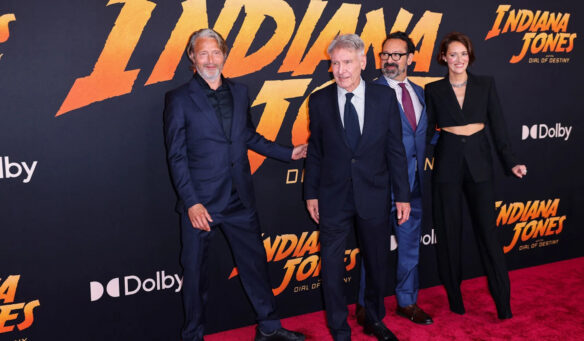
The boredom of his present reality is made all the more excruciating by memories of his younger self, a bold adventurer whose intoxicating exploits are brought wonderfully to life once more in the opening sequence of the film, a thrilling joy ride aboard a roaring train, a “Hurricane Express” on which a younger adventurer races atop precarious cars and engines to salvage a precious artifact, rescued from antiquity, from the Nazis amidst the Second World War. Indy is a hero for the ages, a daring archaeological champion risking everything to save history. Versatile character actor Toby Jones is his delightfully goofy colleague, feigning innocence when arbitrarily captured by the marauding enemy. Visually, the controversial de-aging photographic process is stunning, returning star Harrison Ford to his comparative youth four decades earlier, while the journey is joyfully reminiscent of the young “Indiana Jones” sequence aboard a speeding train that begins Indiana Jones and the Last Crusade.
When Indy’s goddaughter unexpectedly appears late in his life, seductively enticing him back into the promise of new adventures and intrigue, his decidedly world-weary traveler is at first reluctant to respond to the alluring call of the wild. Helena, as imagined by Phoebe Waller-Bridge, is a feisty feminist adventurer whose motives are vague and subject to question. However, the lure of just one more adventure is simply too much for an embittered octogenarian to resist, as the proverbial fountain of youth beckons Indiana Jones yet again to go out in a final blaze of glory before his candle burns out, consigning him to his own assortment of molding antiquities.
Returning to the wonderful Wizardry and land of Oz, Indy must rescue the legendary “Dial of Destiny,” a mystical treasure invented by Archimedes, capable of transporting its user through precarious portals in time. Mads Mikkelsen as Doctor Voller is a worthy adversary for Indiana, a NASA scientist and former Nazi, whose relentless quest for the magical artifact would transport him back through the decades to win the Second World War, restoring Nazism to its ultimate glory, to overpower and dominate civilization. Mikkelsen is a venomous villain, chewing the scenery to sinister delight.
John Rhys-Davies returns all too briefly as Sallah, Indy’s former companion in intrigue, to bid him a final glorious adieu, while Antonio Banderas enlivens the scenario with a deep sea diving expedition reminiscent of previous explorations, while recalling Indy’s desperate hatred for snakes. There’s barely a quiet interlude in this frenetic fable in which both Harrison Ford and his beloved alter ego aren’t thrown headlong into a miraculous restoration of energy, exultation, and youth. It’s a thrill ride for the ages, a sweet recollection of a time gone by when knighthood was in flower, and the world was young. The final sequence of the film in which both Indy and his nemesis reach the inevitable conclusion of their journey, while criticized by some as presenting entirely too fanciful a finale, is in truth no less, yet no more imaginative, than the mystical resolution beneath the tombs and destruction of ancient caves from Indiana Jones and the Last Crusade in which the unbelievable becomes believable, and time is itself a relic of antiquity. Those elder youngsters and “fans” whose cynical criticisms have sadly eroded the magic of this masterwork of wonder and imagination have, indeed, grown up … yet forgotten how to grow “down.”
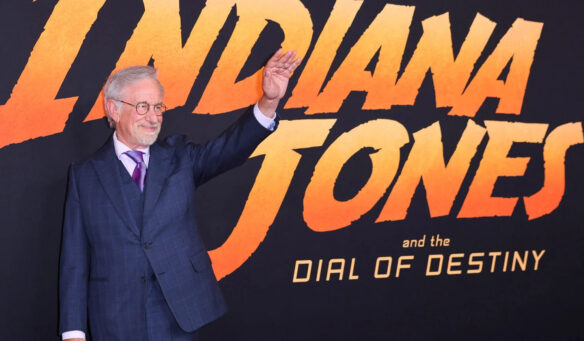
Indiana Jones and the Dial of Destiny is a joyous return to those “thrilling days of yesteryear” when time was gloriously embellished with valiance and heroism, and swashbucklers reigned triumphant over villainy, rescuing their ladies fair from the jaws of treachery. This is, at last, the “Indiana Jones” film that we’ve waited for these endless decades. Following Raiders of the Lost Ark, and Indiana Jones and the Last Crusade, this final adventure must be counted among this classic character’s most wondrous exploits. Harrison Ford is remarkably youthful in his final performance as this iconic hero whose astonishing exuberance and vitality remain an inspiration to all those who have allowed themselves to grow old before their time. Karen Allen as Marian Ravenwood, Indy’s first love, returns during the age defining moments concluding Indy’s melancholy journeys through time and space, recalling tender romance and adoration that refuse the restrictive boundaries of physicality and age.
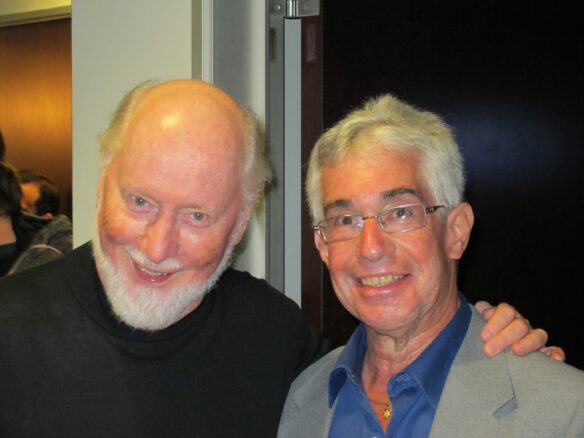
Composer John Williams whose intrepid themes and motifs have wondrously illustrated these journeys and adventures for the past four decades has returned for one final compositional triumph and recording session, filled with breathtaking thrills and heart rendering interludes, richly textured and worthy of Indiana Jones’ truly last crusade. Cinematically, it’s an exhilarating finale and salutation to the exhaustive careers of both this legendary film composer, and remarkable fictional characterization. Look for them only on film, for they represent a world of irresistible fantasy … sadly “gone with the wind.”
Discover more from File 770
Subscribe to get the latest posts to your email.

It’s a much better review than the film deserves.
To be fair, it’s a good film, but not a great one. Expensive (quantity in dollars has a quality all its own) but not inspired.
It suffers from the bane of modern action movies – action sequences that are far too obviously choreographed, that have no emotional investment, that are all placed at the front of the movie leaving us with no real reason to watch the rest.
It lacks an emotional core or a real relationship between Indie, Helena and her sidekick, and therefore leaves everything abstract and hollow. Similarly the villains are very nearly weightless ciphers.
There are a few parts that I liked very much, a number of parts that I found jarring for one reason or another, and one part that I found so ludicrous my laughter peeled through the empty theatre.
It isn’t really much of an Indiana Jones movie. It’s an ‘all right’ modern day action movie with a 295 million dollar budget. Nothing more need be said.
And it’s going to bomb in the theatres.
In my review (still waiting to hit the streets) I say that Raiders and Crusade are classics of modern American cinema. I’d give them both A+ grades.
Meanwhile Temple of Doom and Crystal Skull I’d put at roughly B-. Not bad, not great.
This final installment also falls in that B- range for a bunch of different reasons.
I do have to say that I’ve been treated to several “reviews” that express a kernel of truth about the problems within the Dial of Destiny. If only they could resist the temptation to parlay those legitimate criticisms into an epic ballad about the final destruction of the American cinematic tradition and perhaps…perhaps!…the fall of Western civilization.
Regards,
Dann
Glad to be from a WEIRD tradition.
The critics and naysayers be damned; it’s a MAGNIFICENT ending for Indiana Jones; 4/4 stars on my Leonard Maltin film scale…
Great review for a great film. It has been ages since I could feel like a kid again in the cinema butthis movie managed to take me back to my youth. I enjoyed it very much.
I am really looking forward to seeing this new movie. The first, third and fourth of the series were in my opinion excellent, and are engraved in my memory. Indy’s youth is my youth, I am 80 too, and Ford is carrying the flag for us geezers who are still healthy and ready to continue our adventures. I am not up to repeating my youthful adventures when I camped out for 30 days crossing the country on my thumb and crossing the Mojave in a boxcar with a 60 pound backpack and a Baby Browning in my back pocket. Maybe I would take LSD again or take off on a motorcycle, but not those two at once as I did 50 years ago. However, I am considering a last road trip in my own car, cross country, stopping in on all my old friends who are dispersed in different cities today. My Last Crusade,, hahaha…
A damn good film! To heck with the naysayers. It was a delight to watch and a solid Indy installment AND a great way for Ford to go out.
There are some people that NO studio can satisfy no matter what. This movie was fantastic, and exactly the correct way for the franchise to wrap up…perhaps because there was no social issue commentary and it had a happy ending, are the reasons some of these people are unhappy with it…
It’s a good movie, it’s not a perfect movie.
It suffers from some of the standard flaws of modern action movies – the action scenes go on way too long, because with CGI and affects, they’re incredibly expensive and producers insist on having all that expense up on the screen, even when the length and volume starts to drag down. They’d rather cut a scene of two people talking, because those scenes are cheap. The problem with long action sequences is that they get tiring rather than exciting.
It suffers from having the critical action sequences up front of the movie, leaving the rest of the movie to slowly peter out. Think of it as premature cinematic ejaculation. Having blown the load early on in the opening and first act, there’s nothing to do in the second and third act but drag.
The writing is very clunky, with giant awkward blocks of exposition, and a tendency for characters to make ‘announcements’ just in case the audience fell asleep or something and needs to be caught up quickly.
There’s no real emotional relationship or involvement between Helena or her sidekick and Indy. It amounts to three people who barely know each other having an adventure and continuing to barely know each other. There’s not a lot of heart.
There are all kinds of little technical glitches or wrong beats which are insane to have in a movie this expensive.
It’s a decent movie, I liked it. I thought Helena was fine, I thought Phoebe Waller-Cates was fine. There’s a lot of stuff to like. I am so tired of the shrieking Anti-Woke crowd.
But in the end, it’s not great. It’s basically okay.
@D.G. Valdron
To quote a version of William Shatner, “As am I”. Many of the pre-release speculations centered around the potential for the Helena Shaw character to replace Indiana Jones. It was all a bit overwrought.
The constant critical commentary about Kathleen Kennedy’s mishandling of Lucasfilm/Marvel/Disney IPs also gets a bit old. Her leadership of those properties has been less than stellar, but it is not the end of Western Civilization. Have a sense of scale, folks.
At the same time, I’m also tired of the Anti-Anti-Woke crowd…or maybe just plain Woke crowd…that insists that all critical responses are rooted in some flavor of -ist, -ism, or -phobia. Nope. Your comments would fit in quite nicely with most of the other criticisms I’ve heard/read.
Minus their over-the-top bemoaning of the end of Western Civilization or something.
Regards,
Dann
Political correctness is America’s newest form of intolerance, and it is especially pernicious because it comes disguised as tolerance. It presents itself as fairness, yet attempts to restrict and control people’s language with strict codes and rigid rules. I’m not sure that’s the way to fight discrimination. I’m not sure silencing people or forcing them to alter their speech is the best method for solving problems that go much deeper than speech. – George Carlin
I think Social Media brings out the worst in us. It takes away that social lubrication of thoughtfulness and tolerance, promotes and advances extremist and incautious views and emphasises emotional reaction – jolts. It’s like hate based talk radio of the 80s and 90s has become a way of life.
Personally, I think Kathleen Kennedy is a dogs breakfast, but not for the reasons the Anti-Woke crowd thinks. The way they describe her, she’s Satan with a feminist agenda.
The reality is that Kathleen Kennedy inherited IP whose major stars were two generations past their prime, long in the tooth in their 70s and looking it. She had to formulate a strategy to deal with that. Her ideas – bringing in a new generation of actors, encouraging diversity, bringing in hot new talented writers and directors, giving them creative freedom that was all sound.
The problem was not feminism or intersectionalism or wokeness, but that she mucked it up. Rey as a self insert character ascended but never evolved. The handling of characters like Finn and Rose Tico was blandly racist. Directors were given too much freedom and sabotaged each other or simply floundered. So suddenly, hands off policies were replaced by micromanagement, exploding budgets, reshoots, and endless dumpster fires. In the end, the problem with Kennedy was not her vision, but the lack of it, not wokeness, but simply poor management.
Indiana Jones and the Dial of Destiny was all right, but it was also sloppy and it lacked the cleverness and heart of some of the previous films. It certainly wasn’t a dumpster fire, and it mostly worked and there was a lot to like. But it also felt derivative and a bit tired. Bottom line, good but not great.
@D.G. Valdron
I held onto this for a few days to mull it over. I agree with your thoughts about the caustic/intolerant nature of social media. It’s why I mull things over for a few days.
I find your comments about Ms. Kennedy to be interesting. Most of your thoughts fit right in with the majority of non-leftist opinions. There are always cranks/edge-lords/whatever that present comments that go beyond criticism. Quite frankly “dogs breakfast” falls in that category for me.
I think I can agree that feminism/intersectionalism/wokeness aren’t the culprit here. Instead, the culprit is what I perceive to be Ms. Kennedy’s funhouse mirror version of “feminism/intersectionalism/wokeness”. Gender or race-swapping characters are the limit of her (apparent) vision. Her general outlook, typified by “the force is female”, possesses no vision beyond rhetorically shoving male characters into the background so that “the girls can have a turn”.
That is a flawed perspective that underestimates the fans she is trying to serve. Guys loved Princess Leia. We loved Sigourney Weaver’s “Ripley” from the Aliens series. While not major characters, I also loved Vasquez and Cpl. Ferro in Aliens. Contrary to Jennifer Lawrence’s perception, there have been strong female characters onscreen since the dawn of cinema. (I’ve found some of Ms. Lawrence’s work to be wonderful as well, FWIW.) Well-written characters of any stripe will always be appreciated.
Ms. Kennedy’s thoughts appear to be hampered by a zero-sum mentality. That women cannot be seen as strong unless men are presented as weak. She also appears to have a flawed “anyone can do anything at anytime” mentality.
Maybe…just maybe…it would be productive to engage with the people criticizing Hollywood (including criticisms of Ms. Kennedy) to see where they have a valid point as well as where they being reactionary. To automagically preclude their perspectives from consideration is itself a reactionary response.
Regards,
Dann
Popular opinions, on subjects not palpable to sense, are often true, but seldom or never the whole truth. – John Stuart Mill
Yeah, sorry. No. I’m going to disagree. Essentially, the argument seems to be that “feminism 30 or 40 years ago was all right, but feminism now is wrong!”
Yeah, not really buying that whole nostalgia thing. I don’t think anyone can really argue that a television show fifty years ago which explored racism by having white-black people oppressing and hating on black-white people can really be described as subtle and even handed.
I don’t want to get into Star Wars, which is where this would otherwise go. But let me offer some thoughts. Creators or those in Creative control typically reflect where they are in life at a particular moment in their creative decisions.
Struggling rock stars sing about making it, partying and trying to get ahead; successful rock stars sing about groupies and limousines; the avatar of a young George Lucas into hot rods, ambitious to go somewhere and oppressed by the system is Luke Skywalker. The avatar of an older George Lucas, still thinking of himself as creative and rule breaking, surrounded by accountants, sitting through boring meetings, is Qui Jon Quinn, with his sidekick ‘by the books’ Jedi accountant Obi-Wan.
So where is Kathleen Kennedy in her life as dominant creative – She’s spent her entire life toiling in the salt mines, part of something huge, but never appreciated, building all the skills, the connections, brilliant but unappreciated, until one day she ascends into the fulness of power and takes center stage. That’s her creative story at this point in her life – obscure, brilliant, overlooked and once ascended great at everything.
This is Rey Palpatine-Skywalker, toiling away on a desert planet, a peon scavenging and dissecting giant star cruisers, unappreciated and overlooked but hypothetically building every skill and capacity ever – until finally the fates move in the right way, and she ascends, and is instinctively and automatically brilliant at everything from using the force without training, light saber dueling, flying and fixing the millennium falcon.
It’s hard to see Rey as anything else but a reflection of Kathleen Kennedy’s own narrative of obscure toil/sudden ascension. It’s the equivalent of rock stars who make it big and suddenly their songs are all about limousines and groupies and being famous. In both cases, its just a reflection of where they are in life, nothing deeper than that. And I suppose, it’s equally out of touch.
Luke Skywalker resonated because he reflected the desire to escape, to have adventures, to move on and do things and grow, that every teenager or young adult has.
Rey probably resonates with self-regarding second in commands of either sex, the frustrated middle agers hitting the glass ceilings, twice as good as their boss if only they could take the position, but having to wait to ascend and be brilliant. I suspect that there may not be enough of those to support Star Wars.
I don’t really see all that much intersectional feminism or woke enlightenment in the rest of the new wave of Star Wars. Kennedy’s lack of interest in the details was almost palpable. How else do you explain a train wreck like Solo? And as far as ‘woke-ism’ the handling of both Finn and Rose Tico verges on racist, and both characters are literally abandoned. Nor does ‘woke-ism’ explain being asleep at the wheel as the trilogy literally goes off the rails, as each Director sabotages their predecessor.
But I didn’t want to talk about Star Wars.
In contrast, I don’t see Indian Jones as a case study for the argument for intersectional-feminism or woke-ism. Laziness and ineffectuality certainly. Incoherence, apparently. Desperation definitely. But wokeness? Nah.
Helena, as a character, and as played by Phoebe Waller-Bridge certainly is not an avatar of Kathleen Kennedy. Not the way that Rey is. Phoebe Waller-Bridge is a conflicted (possibly badly written) character, at once clinging to her past, and at the same time repudiating it.
In her opening scenes, sitting in the classroom, she’s thrilled to be seeing and listening to Indy, she’s the only one with enthusiasm in the class. She talks constantly about her father and her father’s obsession, read and practically memorized his journals, and clearly follows in his footsteps. She’s never left that girl behind. She’s shaped herself in their image, becoming gifted with languages and archeology.
But at the same time, she’s become utterly mercenary, locking Indy in and leaving him to Nazis while she escapes, freebooting around the world, cheerfully betraying her father and Indy’s ideals by stealing and selling antiquities. There’s an element of rebellion and resentment to that. And that selfishness is also expressed in suggestions of manipulative promiscuity.
And it’s a contradiction that Indy actually explicitly calls her out on.
She’s brutally callous, something that Indy also calls her out on repeatedly, particularly when one of his friends is murdered right in front of him.
But she’s not completely callous. She’s formed a human bond with her teenage sidekick, a boy who she clearly cares for and protects, as well as being her partner. I was waiting for the story to reveal that he was her son.
And arguably, she experiences growth as a person, in the beginning, she abandons Indy to save herself and pursue her selfishness. In the end she chooses to risk her own life for him, possibly futilely, when for all she knows he’s already dead – she also chooses to risk it all chasing and trying to stop Nazis because its the right thing to do. She’s setting aside her mercenary nature to become her idealized self – in the mold of her father and godfather.
Honestly, there’s a character there. I don’t know how well she actually works, how fully realized and convincing she is. But either that was what they were going for, and they may have been a bit clumsy in execution, or they were just stumbling around and someone involved with the script had the sense to lampshade the contradictions. Or maybe it was accidental. But I’ll give them marks.
The character also deliberately, and effectively plays off of Indy’s dour grumpiness, seriousness and cynicism, by being glib, quick, cheerful and funny. Mercenary to his intrinsic idealism. Selfish to his altruism. They bounce well off each other.
And I find absolutely nothing wrong with Phoebe Waller-Smith’s performance. Whatever we can say about the script or her character, she gives her performance 100%.
Helena is definitely not a self insert cipher like Rey is.
The movie is flawed as I keep saying, and merely good rather than great. Most of these flaws are the generic flaws of modern Hollywood, the bad habits that have taken root. Some flaws are pure sloppiness and not thinking things through. Some flaws are a lack of heart.
And yes, some flaws are laid directly at Kennedy’s door. But these flaws do not trace back to her ‘intersectional feminism’ or ‘wokeness.’ They’re an outcome of Kennedy’s flaws and failure, not of ideals or idealism, but from simply being a bad manager, making bad management decisions, being basically a good second who turns out to be a lousy first.